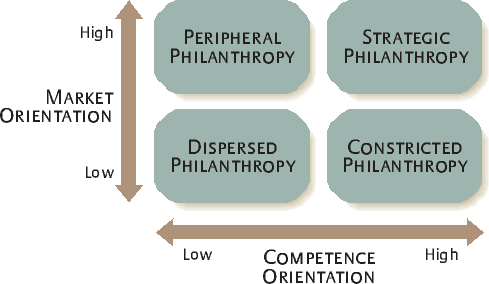Corporate philanthropy and climate resilience: Protecting our future
Discovering Just How Company Philanthropy Shapes Brand Name Online Reputation and Client Loyalty
Corporate philanthropy greatly affects brand reputation and consumer loyalty. Companies that involve in authentic philanthropic efforts frequently see a positive change in how customers view them. This alignment of worths fosters depend on and emotional links with audiences. Nonetheless, the efficiency of these philanthropic initiatives can vary significantly. Comprehending what truly reverberates with customers is vital for brand names looking for to enhance their social influence and market placement. What methods will become crucial for future success?
The Development of Company Philanthropy
As businesses progressively recognize their role in culture, the advancement of business philanthropy has actually changed from mere philanthropic contributions to a critical component of brand name identification. Initially, business participated in philanthropy primarily for tax advantages or to boost their public image. In time, this strategy changed as stakeholders-- including clients, workers, and capitalists-- demanded a more authentic dedication to social responsibility.
Organizations began aligning their philanthropic efforts with their core values and company goals, causing even more thoughtful and impactful contributions. This modification has encouraged companies to invest in sustainable practices and community development, fostering a sense of objective that reverberates with customers.
Additionally, technological developments have facilitated transparency and involvement, permitting services to showcase their philanthropic initiatives extra properly. As a result, company philanthropy has actually become an integral component of service technique, with companies accepting the opportunity to favorably influence culture while improving their overall brand name narrative.
The Influence of Philanthropy on Brand Name Perception
While firms engage in kind efforts to advertise social good, these efforts substantially shape brand name perception amongst customers. Business philanthropy can boost a brand's image by linking it with favorable social influence and community involvement. Customers commonly perceive brand names that proactively join philanthropic activities as more trustworthy and liable. This perception can influence purchasing decisions, as customers might choose brand names that show a commitment to social problems.

Building Emotional Connections Through Providing
Business philanthropy acts as an effective device for enhancing brand identity by linking corporate values with community needs. With tactical providing, business can promote neighborhood interaction and produce shared values that resonate with customers on a psychological degree. This strategy not just reinforces brand name online reputation but also builds lasting connections between services and their stakeholders.
Enhancing Brand Identity
When companies engage in philanthropic initiatives, they not just add to societal good but additionally build deeper emotional links with their target markets. By straightening their brand with charitable reasons, companies boost their identity and signal values that resonate with customers. This placement produces a narrative that exceeds product or services, inviting consumers to take part in a shared goal. As consumers progressively prioritize purpose-driven brand names, business that actively participate in giving can differentiate themselves in a jampacked market. Such efforts foster a feeling of commitment among consumers who feel directly linked to the brand name's values. Inevitably, business philanthropy becomes a crucial tool for enhancing brand identification, cultivating long-term connections based upon shared ideas and emotional interaction.
Fostering Neighborhood Engagement
Countless studies show that companies involving in community-focused kind efforts can considerably reinforce emotional links with their stakeholders. By purchasing local projects and supporting social causes, services grow a sense of belonging and depend on within the neighborhood. This involvement fosters a favorable brand name picture, as consumers value firms that show real concern for social issues. Employees often really feel extra proud and determined to be connected with an organization that prioritizes neighborhood welfare. Therefore, customers are most likely to develop loyalty in the direction of brand names that actively contribute to significant causes. Ultimately, fostering neighborhood involvement via philanthropy not just boosts brand credibility however additionally develops long lasting psychological connections that profit both the area and the firm it offers.
Producing Shared Values
How can organizations efficiently produce shared worths that reverberate with their stakeholders? Business can achieve this by aligning their philanthropic initiatives with their core goal and the rate of interests of their neighborhoods. By participating in initiatives that address neighborhood demands, organizations promote psychological connections with consumers, boosting brand name loyalty. For instance, partnering with non-profits that mirror shared values strengthens the brand name's picture and demonstrates dedication to social duty. Furthermore, transparent interaction about these initiatives allows stakeholders to see the tangible impact of their payments. Ultimately, by incorporating shared worths into their company philanthropy, companies not only boost their track records but additionally cultivate long-term connections with customers, causing increased commitment and trust. This alignment is essential in modern consumer decision-making.
Case Researches: Successful Philanthropic Campaigns
Checking out effective philanthropic projects discloses numerous methods that enhance brand online reputation. Impactful area campaigns, cutting-edge collaboration models, and long-lasting engagement techniques have actually proven efficient in cultivating favorable connections with customers. These study highlight the value of thoughtful corporate providing website link in attaining both social and business objectives.
Impactful Neighborhood Initiatives
Several firms have successfully leveraged humanitarian projects to boost their brand name reputation while making a significant effect in their neighborhoods. For example, a technology company released an electronic literacy program in underserved neighborhoods, offering training and resources that equipped regional homeowners. This campaign not just added to neighborhood advancement however likewise positioned the business as a socially responsible leader. Similarly, a significant food firm applied a cravings alleviation campaign, partnering with local nonprofits to distribute dishes to family members in demand. This initiative enhanced neighborhood ties and cultivated consumer loyalty. Via these impactful campaigns, companies have shown their commitment to social responsibility, efficiently straightening their brand name values with the needs of the areas they offer, eventually enhancing their total track record.
Ingenious Partnership Versions
The success of impactful neighborhood initiatives commonly hinges on cutting-edge collaboration designs that unite diverse stakeholders to attend to facility social difficulties. Situation research studies highlight exactly how corporations, non-profits, and federal government entities can work together properly. As an example, a multinational corporation partnered with a neighborhood charitable to launch an education and learning program, pooling sources and competence to improve community proficiency prices. One more instance entailed a tech business and a healthcare company joining pressures to establish a telemedicine remedy for underserved populations. These partnerships not just amplified the reach of humanitarian initiatives but likewise enhanced the brand names' credibilities by straightening their goals with community requirements. Eventually, cutting-edge collaboration versions work as a driver for significant adjustment and foster more powerful links in between brands and their consumers.
Long-lasting Engagement Methods

Measuring the ROI of Company Social Obligation
As companies increasingly buy company social obligation (CSR) initiatives, recognizing the return on financial investment (ROI) related to these efforts comes to be necessary. Determining ROI in CSR is multifaceted, usually incorporating both quantitative and qualitative metrics. Monetary returns can be assessed through raised sales, improved brand name loyalty, and boosted worker spirits, which can cause higher efficiency. Additionally, business may examine cost financial savings linked to lasting practices, such as lowered waste or energy intake.
Qualitatively, the impact of CSR on brand name reputation can be examined through consumer assumption studies and social media sites view evaluation. Studies can offer understandings into exactly how CSR tasks influence client commitment and trust. Additionally, benchmarking versus industry requirements can assist companies evaluate their CSR efficiency. Eventually, a comprehensive technique to gauging ROI enables companies to make educated choices concerning future CSR investments, aligning techniques with both monetary efficiency and social influence
Customer Expectations and Corporate Responsibility
Progressively, customers anticipate firms to run with a solid feeling of company duty, viewing ethical practices as a prerequisite for image source brand loyalty. This shift in expectation reflects a growing awareness of social and environmental problems, leading clients to favor brands that line up with their values. Consumers are more inclined to sustain go to the website firms that participate in clear methods, demonstrate sustainability, and contribute positively to their communities.
Social media enhances these expectations, permitting consumers to share their experiences and point of views swiftly. Brands that fall short to fulfill these ethical criteria run the risk of backlash, while those that welcome business duty commonly delight in enhanced track record and customer commitment. As consumers require accountability, firms should incorporate business social duty into their core approaches, prioritizing moral habits not equally as an advertising strategy, yet as a basic element of their procedures. This positioning can inevitably result in more powerful brand fondness and continual success in competitive markets.
Future Fads in Company Philanthropy and Brand Name Commitment
The landscape of corporate philanthropy is progressing, affected by the increased consumer assumptions surrounding corporate obligation. Companies are progressively incorporating social impact into their core service approaches, not merely as a supplementary task. Future trends indicate a shift towards openness, with brands sharing comprehensive info concerning their philanthropic initiatives and their direct impacts on areas.
Moreover, innovation is playing an essential role, enabling real-time engagement between customers and brand names. Social network platforms assist in straight interaction, permitting customers to articulate their assumptions and hold brand names liable. Furthermore, more youthful generations, especially Millennials and Gen Z, prioritize sustainability and honest methods, driving companies to embrace more conscientious approaches.
As corporate philanthropy comes to be identified with brand name identity, business that authentically align their missions with social demands are most likely to promote stronger consumer commitment. This merging of values will ultimately form the future of business track record and consumer relationships in an increasingly diligent industry.
Often Asked Questions
How Do Customers Discover Out About a Firm's Philanthropic Initiatives?
Consumers uncover a company's humanitarian efforts via different channels, consisting of social networks, press releases, area events, and word-of-mouth. These avenues assist in awareness, enabling people to engage with brand names that align with their worths and rate of interests.
What Role Does Staff Member Involvement Play in Company Philanthropy?
Worker involvement in company philanthropy enhances involvement, fosters a feeling of ownership, and reinforces group cohesion - corporate philanthropy. This engagement commonly enhances the influence of charitable campaigns, leading to higher awareness and support for the firm's philanthropic initiatives
Can Corporate Philanthropy Backfire on a Brand name's Credibility?
Company philanthropy can certainly backfire on a brand name's online reputation if perceived as insincere or opportunistic. Adverse public perception might emerge, bring about decreased depend on and commitment among consumers who focus on credibility in company actions.
Are Smaller Business as Efficient in Philanthropy as Larger Firms?
Smaller sized companies can be similarly efficient in philanthropy as bigger firms, often demonstrating agility and authenticity. Their local initiatives might resonate extra deeply with communities, promoting authentic connections despite restricted sources contrasted to their bigger equivalents.
Just How Can Firms Pick the Right Causes to Support?
Business can select the ideal trigger by aligning their values with neighborhood requirements, examining stakeholder rate of interests, and examining prospective effect. This tactical method promotes authenticity, enhances engagement, and strengthens links with consumers and the wider neighborhood.
While business engage in kind initiatives to advertise social great, these initiatives significantly shape brand name understanding among consumers. As customers significantly prioritize purpose-driven brands, firms that proactively engage in giving can separate themselves in a congested market. Numerous companies have efficiently leveraged humanitarian campaigns to boost their brand credibility while making a meaningful influence in their neighborhoods. Increasingly, customers expect companies to operate with a solid feeling of company duty, seeing honest practices as a requirement for brand name loyalty. As company philanthropy comes to be identified with brand name identity, business that authentically align their missions with social demands are most likely to cultivate more powerful consumer loyalty.